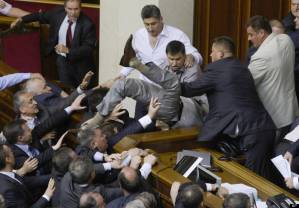Latest use or abuse of the “language issue”

Ukraine’s Verkhovna Rada 24 May 2012
Fights and disruption of parliament at the end of last week prevented consideration of the latest draft bill on language policy. Some analysts believe that the conflict suited the ruling Party of the Regions since on this one occasion the ruling majority was not unanimous, and the bill might not have gained a simple majority The bill has not been withdrawn, and is being actively pushed by the Party of the Regions, with the claim being that it complies with European standards and recommendations.
The “language issue”, essentially the role of the Russian language, is dragged out of the cupboard and aired before every election. It is interesting that most public opinion surveys place “the language issue” very low in the list of issues concerning the majority of Ukrainian citizens. This is not the impression politicians try to give as elections approach, nor that which the world media received when it covered the latest bloody conflict between members of the ruling majority and opposition in parliament on Thursday evening. The opposition, and a number of civic organizations, were protesting against parliament’s first reading of a draft Law on the Principles of Language Policy No. 9073, drawn up by Serhiy Kivalov and Vadim Kolesnichenko. This purports to respect this particular role of the Ukrainian language and only safeguard the rights of linguistic “minorities”
While ethnic Russians are a minority in Ukraine, claims that the Russian language is a “minority” language have not convinced such bodies as the Council of Europe’s Venice Commission and OSCE and elicit profound scepticism from many Ukrainians. Russian is widely used everywhere, with Ukrainian much less common in the South and East of the country. Even in the predominantly Ukrainian-speaking West of the country it is still harder to find books in Ukrainian than in Russian. The draft law which would entail amendments to some 33 other laws would make Russian a de facto second official language in areas with a large “minority” of Russian speakers. Since there are areas where it is already hard to function in day-to-day life in Ukrainian (the Donetsk and Luhansk regions, the Crimea, for example), if the bill is passed, using Ukrainian is likely to become even harder.
There is, however, widespread – although by no means universal – opposition to any change in the Constitution making Russian a State language. Such promises have been consistently made by the Party of the Regions before elections, but they would require a constitutional majority (over 300 votes) and there has never been any chance of obtaining this. In fact, one of the three main parties in the ruling majority, the People’s Party of Speaker Volodymyr Lytvyn does not appear to be supporting draft bill No. 9073.
President Yanukovych was reported in March as promising that Ukraine would soon have two official languages, though he has made a number of contradictory statements over the last 2 years. Now with elections approaching, many analysts believe that the language issue is being used as a winning card among traditional voters in the predominantly Russian-speaking East and South of the country who are otherwise disgruntled with the Party of the Regions.
At present the Head of the Party of the Regions faction in parliament, Oleksandr Yefremov is asserting that the bill cannot be withdrawn and claiming that it was positively assessed by experts and that it meets all the requirements of the European Charter. The Venice Commission’s assessment certainly states that in comparison to the previous bill drawn up by Yefremov, the leader of the communists in the Verkhovna Rada and others, No. 9073 is a move in the right direction, but in no way suggests that the draft law meets requirements, and in fact says that it needs more reworking.
The language issue in Ukraine is partly so convenient for politicians because it enables distracting rhetoric and unsubstantiated charges while the vast majority of people have no idea what is actually contained, for example, in the European Charter, and how such draft bills have been assessed. While not resolving these problems, there is clearly need for translation of all documents involved.
In April a letter signed by “the national minorities of Ukraine”, and supposedly representing 120 national minority organizations was sent to the OSCE and a number of other European structures. It expressed anger over a report not even publicly available by the OSCE High Commissioner on National Minorities regarding the bill. The public response from the Congress of National Communities of Ukraine stated that “neither the Law on the ratification of the Charter of Regional or Minority Languages, nor the Draft Law on the Principles of the State Language Policy have had unequivocal support either from among national minorities or from the Ukrainian public in general”.
The conflict on Thursday and Friday in parliament give some grounds for hoping that at least this highly contentious bill will not be automatically “voted in” by the ruling majority, though this is by no means guaranteed. Open and informed public discussion is clearly vital.





